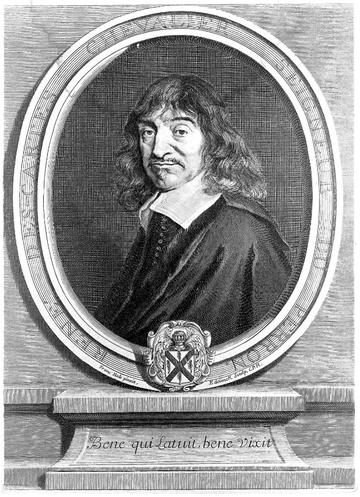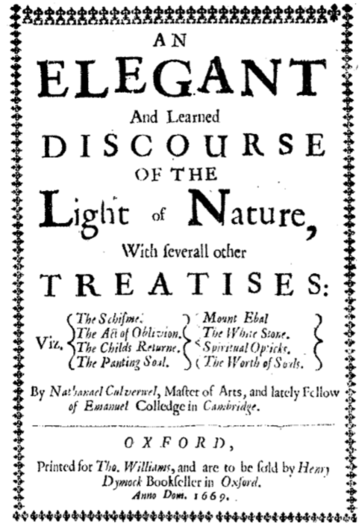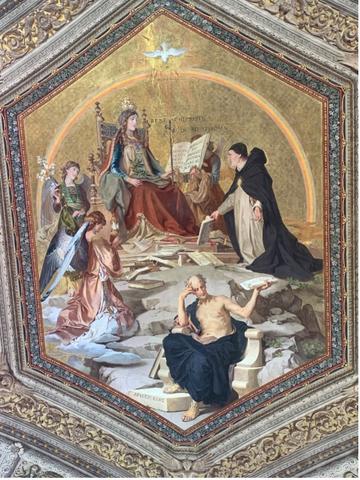Nathaniel Culverwell and the early English Reception of Descartes
The earliest evidence of an English engagement with René Descartes’ philosophy appears in John Hall’s Horae Vacivae (1646) and the first substantial discussion of the Frenchman’s ideas came a year later with Henry More’s Infinitie of Worlds (Nicholson, 1929). Yet in 1645-46, whilst writing An Elegant and Learned Discourse on the Light of Nature (1652), More’s Cambridge contemporary Nathaniel Culverwell also discussed Descartes’ thought. That Culverwell’s little-known reference to Cartesianism was one of the earliest in English is not what is most intriguing about it, however. Far more interesting is the fact that Culverwell, in Chapter XIV, confidently dismisses Descartes’ famous solution to the problem of certainty in less than half a page.
Given Descartes’ indisputable status as one of the great thinkers of the early modern age and the gargantuan corpus of scholarly work his legacy has inspired across many disciplines, one could be forgiven for overlooking the scribblings of an obscure seventeenth-century Cambridge Divine who apparently did not seriously engage with the Cartesian proposition. Nonetheless, I think this would be a mistake. By exploring the possible reasons for why Culverwell felt he was able to dispatch Descartes’ cogito argument so briskly, we will be able to expose the gulf between the philosophical premises of Cartesianism and an older Aristotelian-Scholastic tradition it is widely held to have displaced.

Rene Descartes, G. Edenlick.
The narrative of Descartes’ doubt, his subsequent bonfire of assumptions and quest to construct a new epistemology rooted in the claim: ‘I think therefore I am’, is well known. So too are the various contextual explanations for why he was motivated to pen his Meditations (1641). These included his desire to invent a metaphysics to support his novel physics; a pressing need to refute resurgent scepticism and the related demand, impressed on Descartes by Cardinal Bérulle, to exercise his intellectual talents in the war against ‘atheism’. Descartes’ solution to the problem of uncertainty was as radical as it was ingenious. In a move that up ended the tables of his Jesuit teachers, he instigated a reversal of an age-old assumption by making the subject antecedent to the object, positioning the self before reality and therefore epistemology prior to metaphysics. Whilst it is well known that the cogito which describes this philosophical relationship can be traced back to St Augustine, the Bishop of Hippo never demanded that thought be the guarantor of the existence of external reality.
Yet Descartes did. Certainty according to Descartes was guaranteed by clear and distinct perceptions and insured by the existence of a God that cannot lie. Whilst Descartes’ swashbuckling Meditations and later texts earned him an international reputation for apologetic, underlying his philosophy were some fairly spectacular assumptions. Not the least of which was the suggestion that one can bridge the gap between thought and reality, by beginning at the former and traversing to the latter. Given the fierce debates that occurred in Descartes’ lifetime regarding his work, not to mention the centuries long debates over Cartesianism which would follow, it is far from clear that he satisfactorily proved this point.

Frontispiece of Culverwell's Discourse (1669)
Culverwell’s Discourse is an essay on the role of reason in religion that ought to be read within the context of heated Puritan disputes that raged in England in the latter years of the English Civil War. The Cambridge Divine sets out on a crusade to defend reason from the libels of Catholics, and Protestant theologians of both conservative and radical stripes, who call for ‘reason’ to be removed from the Pulpit. A backlash that Culverwell understands as a response to the misrepresentation of ‘reason’ by Socinians and its abuse by Arminians. At the heart of the Discourse is the suggestion that reason has value for uncovering the laws of nature which govern Man’s morality. Here, as in the Discourse as a whole, Culverwell leans heavily on St Thomas Aquinas and Francisco Suarez. Man is an intellectual animal whose soul contains a rational aspect which is able to induce knowledge of the true and the good by drawing upon sensory experience, in collaboration with in-born first principles and a practical habit for applying these known as Synderesis, which is referenced in Proverbs 20:27. Certainty, in this Aristotelian-Thomist tradition, is firmly located externally, as intrinsic to reality itself. It has its origins in the Divine. Man comes to certain knowledge thanks to common grace and a designed intellect freely given to him ex nihilo. Occasionally Culverwell balances this Catholic intellectual influence out by borrowing from John Davenant, Girolamo Zanchi and Hugo Grotius in order to preserve his Protestant theological credentials. For example, he emphasises that the imperfection of Man’s reasoning is a product of the Fall and that the fact that some people appear to be more enlightened than others is a sign of their elect status.

Bene Scripsisti De Me Thoma, Fresco in the Gallery of the Candelabra, Vatican City
A problem intellectual historians have run up against when engaging with responses, such as Culverwell’s, to Descartes, is an inability to conceive that their authors might have been able to step outside of the Cartesian paradigm or were inoculated from it by a commitment to pre-Cartesian philosophical traditions. The result is that too often Cartesian premises and assumptions are read into early modern texts to which they do not belong, a particularly nefarious example of what Quentin Skinner termed the ‘mythology of anachronism’. It is because Culverwell’s discussion of certainty in Chapter XIV of the Discourse was rooted in an utterly different set of premises to those of Descartes’ Meditations that he is able to answer the Frenchman so briefly. Such is the emphasis still made on Descartes as the pivot around which the whole of the history of early modern western philosophy turned, that the persistence of older ‘intellectual traditions that could well have emerged triumphant in more favourable circumstances’ is ignored, as argued by Fernando Cervantes in 2010. Culverwell’s Discourse is one such example of this persistence of an older tradition. He describes Descartes as resolving all assurance into ‘thinking that he thinks’ and then questions why assurance can also not be found in ‘thinking that he sees’, before remarking acerbically that if like Descartes says there is value in reflecting about thinking, then surely there is greater value in thinking about thinking about thinking and so on in infinitum. Culverwell cannot agree with Descartes that certainty begins in thought because he does not conceive of the subject as prior to the object. The entire architecture of Culverwell’s theory of reason and its role in religion relies upon final causes (Man’s tending towards the good) and an intuition of objective reality that Descartes explicitly denies. The certain truth is to be reached for by the ‘Candle of the Lord’, Culverwell’s synonym for natural reason, it is not to be found within.
The thrust of this piece has not been to suggest that the more obscure Culverwell merits any kind of comparison with the achievements of Descartes. However, Culverwell as a mouthpiece for an Aristotelian-Thomist tradition gives the lie to the careless assumption that Cartesianism swept away medieval philosophy in one swoop. This vindicates the more recent scholarship on seventeenth century Aristotelianism. Indeed, reading a text like the Discourse is supremely useful for reminding us that there is another way to think about epistemology and metaphysics, a way which reasserts reality itself as the starting point for knowledge and invites us to climb out of the self-centred hole that Descartes dug for us.
Samuel Head is a DPhil Candidate in History at Wolfson College, Oxford. His research focuses on natural theology in the thought of various Cambridge divines during the English Civil War, Interregnum, and early Restoration.


